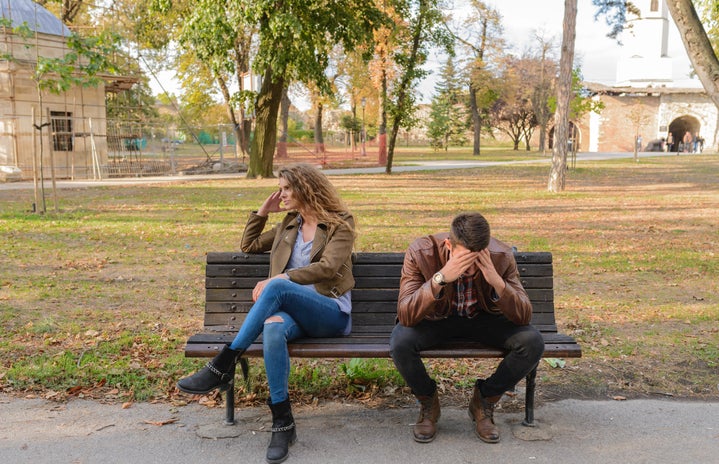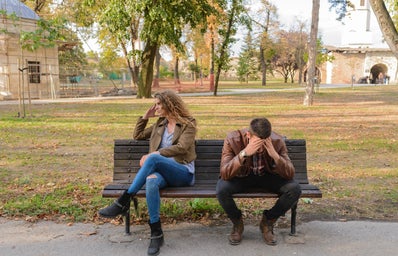Breakups are tough, whether it’s the end of a romantic relationship or friendship. In college, these moments can feel even more intense as we juggle academics, personal growth, and the pressure of finding our way in life. But breakups aren’t just about losing someone—they’re about rediscovering yourself and learning how to move forward. Let’s face it, we’ve all been there: scrolling through old photos, holding on to someone’s presence in our lives even when we know it’s time to let go. It’s time to talk about the emotions that come with breakups and how to be ready for what’s next.
Friendship Breakups
Friendship breakups can be just as painful—if not more so—than romantic ones. These are the people you’ve shared your secrets, laughter, and countless memories with, and when a friendship ends, it can feel like a part of your support system has collapsed. The pain of losing someone you trusted as a friend can be deep, but it’s important to remember that outgrowing friendships is natural. Some people are meant to be in your life for certain chapters, and when those chapters close, it doesn’t mean the bond you shared was any less real. Allow yourself to grieve the friendship, but also trust that new, meaningful connections will come into your life.
Relationship Breakups
Romantic breakups often come with a different kind of heartache. When you’ve built a routine with someone, the end of that relationship can feel like you’re losing part of yourself. It’s normal to question everything—what went wrong, if things could’ve been different, or if you’ll ever find that kind of love again. But healing from a romantic breakup requires you to focus on the present and understand that the love you had wasn’t wasted, even if it didn’t last forever. Let go of the idea that your worth is tied to this relationship’s success, and give yourself time to heal, knowing that love will find you again.
Allow Yourself to Feel the Breakup
One of the most important steps in healing is allowing yourself to truly feel the breakup. It’s tempting to distract yourself or push away the pain, but avoiding those emotions only delays the process. Let yourself grieve what was lost—whether it’s the end of a friendship or a relationship. Cry if you need to, vent to your friends, or journal your thoughts. Feeling the sadness, anger, and confusion is part of healing. It’s okay to not be okay for a while. By confronting your emotions, you give yourself the space to heal fully, and eventually, you’ll come out stronger.
Letting People Be Experiences, Not Possessions
Sometimes, we hold onto people like they’re possessions, afraid that if we let them go, we’ve lost something irreplaceable. But relationships, no matter how long or short, are experiences. They shape us, teach us, and then, sometimes, they end. And that’s okay. Letting go is not about erasing the past, but about making space for new people to come into your life. It’s about realizing that some people were meant to be in your life for a season, not forever, and that doesn’t mean the time was wasted. Understand that just because we may love someone, doesn’t mean you two are compatible.
Cutting the Digital Cord
One of the hardest parts of breakups today is the way we imprison people into our lives through our phones. Even after a relationship has ended, we often keep them around as “mutuals” on social media, scrolling past their updates and photos. Why do we do this? Because deep down, we don’t want to admit that things are truly over. The hope of seeing them again, in person or online, keeps us holding on. But real healing starts when you recognize that it’s okay to let go. Unfollow, mute, or even block if you need to—it’s about protecting your peace.
Appreciating the Time They Served in Your Life
It’s important to remember that just because a relationship—whether a friendship or romantic one—didn’t last forever, it doesn’t mean it wasn’t meaningful. Some people come into our lives to teach us something or to be there for us during a particular chapter. Appreciating the time they served in your life, even if it was brief, allows you to look back with gratitude rather than regret. Every connection shapes who you are and brings you closer to the person you’re meant to become. By valuing what that person brought into your life, you can honor the experience while still moving forward and making space for new relationships.
Rediscovering Independence
After a breakup, one of the most empowering steps is rediscovering your independence. Relationships often shape our routines, habits, and even our identities, so when they end, it can feel like a part of us is missing. But this is the perfect time to reconnect with who you are outside of that relationship. Take up hobbies you’ve neglected, spend time with friends, or even explore new passions. Embrace the freedom to make choices for yourself again without the influence of another person. Rediscovering your independence isn’t just about being alone—it’s about reclaiming your sense of self and realizing that you are whole on your own.
Breakups are tough, but they aren’t the end. They’re a reminder that life moves forward, and we must move with it. The hardest part of any breakup is feeling like you’ve wasted your love. But love, even when it doesn’t last, is never wasted. Loving someone, whether a friend or a partner, makes us more open, more empathetic, and more aware of what we need in the future. It’s part of what makes us human. Remember, you havent met all the people who are going to love you.





